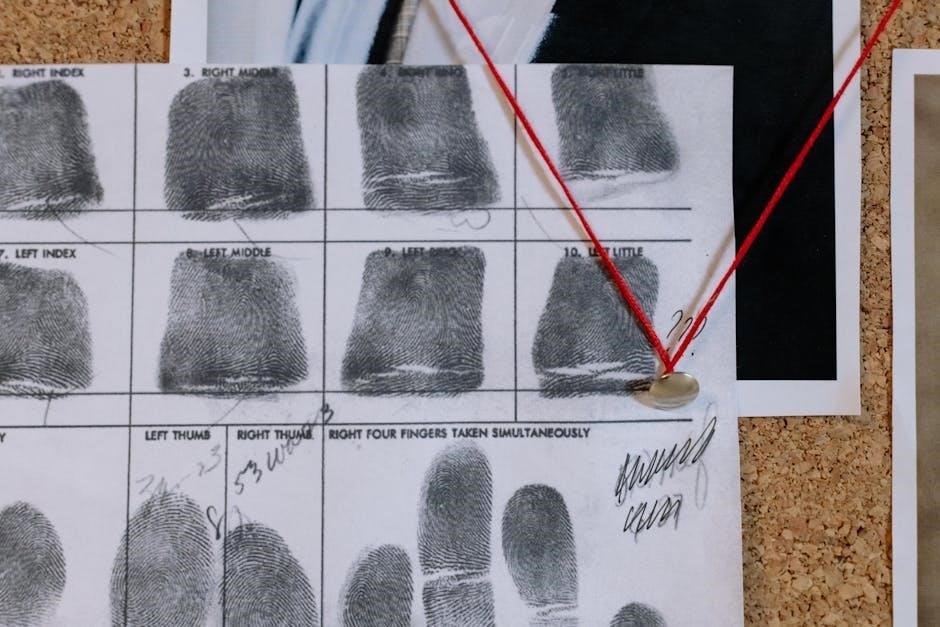
The Idaho Criminal Jury Instructions provide a comprehensive guide to clarify legal standards and jurors’ roles in criminal trials, ensuring fairness and consistency in Idaho’s judicial process.
1.1 Overview of Idaho Criminal Jury Instructions
The Idaho Criminal Jury Instructions (ICJI) serve as a foundational resource for guiding jurors through the complexities of criminal law in Idaho. These instructions are meticulously structured into sections, including Preliminary, Pre-Proof, and Post-Proof instructions, ensuring clarity at every stage of a trial. They are maintained by the Idaho Supreme Court and are accessible in both Word and PDF formats, offering convenience for legal professionals. The ICJI is designed to provide clear legal standards, elements of crimes, and procedural guidelines, ensuring jurors understand their role and the law. This resource is essential for promoting consistency, fairness, and transparency in Idaho’s criminal justice system, aiding jurors in reaching informed and just verdicts.
1.2 Purpose of Criminal Jury Instructions in Idaho
The primary purpose of Idaho Criminal Jury Instructions is to ensure jurors understand the law, the roles of the court, counsel, and themselves, and the legal standards applicable to the case. These instructions are designed to provide clear, concise, and accurate legal guidance, enabling jurors to deliberate effectively and reach just verdicts. They outline the elements of crimes, defenses, and procedural rules, ensuring consistency and fairness in the judicial process. By clarifying complex legal concepts, the instructions empower jurors to apply the law correctly to the evidence presented. This promotes transparency, accountability, and the integrity of Idaho’s criminal justice system, making the instructions an essential tool for both courts and jurors alike.
1.3 History and Development of Idaho Criminal Jury Instructions
The Idaho Criminal Jury Instructions have evolved over time to provide clear legal guidance for jurors in criminal cases. Originating from the Idaho Supreme Court, these instructions were developed through collaboration between judges, attorneys, and legal experts to ensure accuracy and consistency. The instructions are organized into sections, including Preliminary, Pre-proof, and Post-proof Instructions, each addressing specific stages of a trial. Regular updates reflect changes in Idaho law and legal precedents, ensuring the instructions remain relevant and effective. Accessible in Word and PDF formats, they are widely used by courts and legal professionals. This ongoing development ensures the instructions adapt to the needs of Idaho’s judicial system, maintaining their role as a cornerstone of criminal proceedings in the state.

Preliminary Instructions
Preliminary instructions provide foundational guidance for jurors, outlining their role, trial procedures, and legal principles before evidence is presented, ensuring a fair and informed trial process.
2.1 General Directions for Jury Instruction Use
The Idaho Criminal Jury Instructions provide clear guidelines for their use, ensuring consistency and fairness in criminal trials. Judges, attorneys, and jurors must adhere to these instructions, which outline the proper procedures for presenting legal principles to the jury. The instructions are designed to be clear, concise, and free from bias, allowing jurors to understand the law applicable to the case. They cover essential aspects such as the role of the court, counsel, and jury, as well as the importance of following the law as instructed. Proper use of these instructions ensures that trials are conducted fairly and in accordance with Idaho law, promoting justice and maintaining public confidence in the judicial system.
2.2 Role of the Court, Counsel, and Jury
In Idaho criminal trials, the court, counsel, and jury each have distinct roles. The court ensures the trial is conducted fairly, interprets the law, and instructs the jury. Counsel for the prosecution and defense present evidence and arguments to prove their cases. The jury’s role is to weigh the evidence, apply the law as instructed, and deliver a verdict based on the facts presented. These roles are clearly defined in the Idaho Criminal Jury Instructions to maintain the integrity and fairness of the trial process. Understanding these responsibilities is crucial for all parties involved to ensure justice is served in accordance with Idaho law. Proper adherence to these roles guarantees the trial’s outcome reflects the evidence and legal standards accurately.
2.3 Importance of Following Instructions
Fidelity to jury instructions is paramount in Idaho criminal trials to uphold justice and ensure trial integrity. Jurors must strictly adhere to the court’s directives, as deviations can lead to mistrials or appeals. Instructions clarify legal standards, evidence evaluation, and deliberation processes, safeguarding against personal biases. The court emphasizes that jurors must not discuss the case until deliberation and must base verdicts solely on presented evidence. Failure to comply undermines the trial’s fairness and the rule of law. Proper adherence ensures that the legal process remains consistent, impartial, and aligned with Idaho’s judicial standards, ultimately protecting the rights of all parties involved and maintaining public trust in the criminal justice system.

Pre-Proof Instructions
Pre-proof instructions in Idaho outline jurors’ roles, evidence evaluation, and conduct expectations before trial, ensuring impartiality and preparing jurors to fairly assess the case presented.
3.1 Pre-Trial Instructions for Jurors
Pre-trial instructions for jurors in Idaho are designed to ensure impartiality and prepare jurors for their role in the trial. These instructions emphasize the importance of not discussing the case with anyone, including fellow jurors, until deliberation begins. Jurors are also cautioned against seeking external information or evidence outside of what is presented in court. The instructions outline the duty to remain unbiased, base decisions solely on evidence, and follow legal guidelines. Additionally, jurors are informed about the consequences of violating these instructions, such as being held in contempt of court. These pre-trial directives are crucial for maintaining the integrity of the trial and ensuring a fair evaluation of the case.
3.2 Initial Instructions on Evidence and Burden of Proof
Initial instructions on evidence and burden of proof in Idaho criminal trials clarify the legal standards jurors must apply. The prosecution bears the burden of proving guilt beyond a reasonable doubt, a high threshold requiring overwhelming evidence. Jurors are instructed to base decisions solely on evidence presented in court, such as testimony and physical evidence. They must avoid speculation or personal theories. The instructions emphasize that the defendant is presumed innocent unless proven guilty. Jurors are also cautioned against considering evidence not admitted in court or drawing conclusions from a defendant’s silence. These guidelines ensure jurors understand their role in evaluating evidence and applying the correct legal standard to reach a fair verdict.
3.3 Jury Conduct During the Trial
Jury conduct during the trial is critical to ensuring fairness and impartiality. Jurors are instructed to avoid discussing the case with anyone, including fellow jurors, until deliberation begins. They must not seek or expose themselves to external information, such as media reports or online research, related to the case. Jurors are also prohibited from visiting crime scenes or conducting personal investigations. Instructions emphasize the importance of basing decisions solely on evidence presented in court. Additionally, jurors must follow the court’s rules regarding communication and behavior, such as not taking notes unless permitted. These guidelines ensure jurors remain impartial and focused on the evidence, fostering a fair trial process. Adherence to these instructions is essential to maintaining the integrity of the judicial system in Idaho.

Post-Proof Instructions
Post-proof instructions guide jurors on final deliberations, emphasizing evidence review, legal standards, and proper verdict procedures to ensure a fair and informed decision-making process in criminal cases.
4.1 Final Instructions Before Deliberation
Final instructions before deliberation are crucial in summarizing the case, outlining the jury’s role, and reinforcing legal standards. These instructions ensure jurors understand how to evaluate evidence, apply the law, and reach a verdict. They often include reminders about the burden of proof, the presumption of innocence, and the requirement of proof beyond a reasonable doubt. Judges may also emphasize the importance of impartiality and adhering to the law rather than personal opinions. Additionally, these instructions address procedural matters, such as how to handle deliberations, report deadlocks, and submit questions to the court. Compliance with these instructions is essential to maintain the integrity of the trial and ensure a fair outcome.
4.2 Review of Key Evidence and Legal Standards
The final instructions include a review of key evidence and legal standards to guide jurors in their evaluation. Judges typically summarize the prosecution’s burden of proof, the presumption of innocence, and the requirement that guilt be proven beyond a reasonable doubt. Specific legal elements of the charged crimes are highlighted, ensuring jurors understand what must be proven. The court may also clarify how to assess the credibility of witnesses and the weight of physical evidence. Additionally, instructions often outline defenses raised during the trial and how they should be considered. This review ensures jurors apply the correct legal standards when evaluating the evidence, fostering a fair and impartial deliberation process.
4.3 Instructions on Deliberation and Verdict
Jurors are instructed to deliberate fairly and impartially, discussing the case thoroughly while considering all evidence presented. They must apply the law as instructed by the court to the facts proven at trial. Jurors are reminded to act in good faith, avoiding outside influences or personal biases. The verdict must be unanimous, reflecting the collective judgment of all jurors. If unable to reach unanimity, jurors may notify the court. Instructions emphasize the importance of adhering to the court’s guidance and avoiding speculation or inference beyond the evidence. The foreperson is tasked with ensuring orderly deliberation and reporting the final verdict to the court. These instructions ensure a structured and lawful approach to reaching a just outcome.
Specific Criminal Offenses
Idaho Criminal Jury Instructions outline specific guidance for various offenses, including homicide, theft, and assault. These instructions clarify the elements of each crime, applicable defenses, and legal standards to ensure juries apply the law accurately in criminal cases.
5.1 Homicide and Murder Instructions
Idaho Criminal Jury Instructions for homicide and murder cases provide detailed legal standards to distinguish between degrees of unlawful killing. These instructions outline the elements of murder, manslaughter, and justifiable homicide, ensuring jurors understand the legal distinctions and requirements for conviction. Specific instructions, such as ICJI 1703, address the jury’s role in determining intent, premeditation, and mitigating circumstances. They also clarify defenses like self-defense or insanity. The instructions emphasize the prosecution’s burden to prove beyond a reasonable doubt the mental state and actions constituting murder or lesser-included offenses. This section is critical for ensuring juries apply the law accurately in cases involving the most serious criminal charges. Recent cases, such as State v. Bryan Kohberger, highlight the importance of precise jury instructions in homicide trials.
5.2 Theft and Property Crimes Instructions
Idaho Criminal Jury Instructions for theft and property crimes define the legal elements required for conviction, ensuring jurors understand the distinctions between theft, burglary, and other property-related offenses. These instructions outline the necessary intent, such as the specific intent to deprive ownership, and clarify the types of property covered. They also address the prosecution’s burden to prove unlawful taking, control, or transfer of property. Instructions like ICJI 1801 detail the elements of theft by deception, while ICJI 1802 covers theft by false pretense. The section emphasizes the importance of evaluating evidence, such as ownership and value of property, to determine guilt. These instructions are designed to guide jurors in applying the law accurately to various theft and property crime scenarios. They ensure consistency in how such cases are adjudicated across Idaho courts.
5.3 Assault and Battery Instructions
Idaho Criminal Jury Instructions for assault and battery provide clear definitions and legal standards to guide jurors in understanding these offenses. These instructions distinguish between assault, which involves the threat of harm, and battery, which involves unlawful physical contact. They outline the required mental states, such as intent to cause harm or apprehension of harmful contact. For example, ICJI 2101 defines simple assault, while ICJI 2102 addresses battery, specifying the necessary elements. The instructions also cover aggravated forms of these crimes, including the use of weapons or resulting serious injury. They emphasize the prosecution’s burden to prove intent and the unlawful nature of the act. These instructions ensure jurors apply the law consistently and accurately in assault and battery cases, facilitating fair determinations of guilt or innocence.

Procedural Considerations
Procedural considerations in Idaho criminal jury instructions address handling lesser included offenses, defenses, and special procedures for capital cases, ensuring clarity and fairness in trial proceedings.
6.1 Handling Lesser Included Offenses
Idaho criminal jury instructions address the handling of lesser included offenses, ensuring jurors understand their role in considering these charges. Courts must provide clear guidance on when a lesser offense applies, requiring that it be factually supported and meet all legal elements. Judges instruct jurors to consider lesser included offenses only if the evidence does not support the greater charge but does support the lesser. This ensures fairness and prevents convictions for crimes not proven beyond a reasonable doubt. Proper instruction on lesser included offenses is critical to maintaining the integrity of the trial process and safeguarding the defendant’s rights.
6.2 Instructions on Defenses and Mitigating Circumstances
Idaho criminal jury instructions require clear guidance on defenses and mitigating circumstances to ensure jurors understand their role in evaluating these factors. Courts must instruct jurors on the specific legal standards for defenses, such as self-defense or alibis, and outline the evidence required to support them. Mitigating circumstances, such as the defendant’s mental state or lack of criminal history, must also be clearly defined to assist jurors in weighing these factors during deliberation. Proper instructions ensure that jurors balance the prosecution’s burden of proof with the defendant’s rights, fostering a fair and impartial trial process. This clarity is essential for jurors to apply the law accurately and consider all relevant factors in reaching a verdict.
6.3 Jury Instructions for Capital Cases
Idaho criminal jury instructions for capital cases are uniquely tailored to address the gravity and complexity of such trials. Courts must ensure jurors understand the distinct legal standards and procedures applicable to capital offenses. Instructions often emphasize the two-phase process: determining guilt and deciding the penalty. Jurors must be advised to avoid external influences, such as media coverage, and focus solely on evidence presented. The court’s instructions must clearly outline the state’s burden of proof and the defendant’s rights. Additionally, jurors are instructed on the consideration of aggravating and mitigating factors during the penalty phase. These instructions are critical to ensuring a fair and impartial trial, balancing the severity of the crime with the legal safeguards in place to protect the accused.

Controversial Aspects
Controversies surrounding Idaho criminal jury instructions often involve death penalty instructions, handling of lesser included offenses, and burden of proof interpretations, sparking debates on fairness and clarity.
7.1 Death Penalty Instructions
Death penalty instructions in Idaho are highly scrutinized due to their complexity and the gravity of their implications. These instructions outline the legal standards jurors must consider when deciding whether to impose the death penalty, focusing on aggravating and mitigating factors. Recent cases, such as Bryan Kohberger, have highlighted controversies surrounding grand jury instructions and the interpretation of capital punishment statutes. Critics argue that certain instructions may not adequately clarify the burden of proof or the weighing of factors, potentially leading to inconsistent or unfair outcomes. Additionally, debates arise over the clarity of instructions regarding the jury’s role in balancing mitigating circumstances against aggravating factors, raising concerns about transparency and justice in capital cases.
7.2 Instructions on Lesser Included Offenses
Instructions on lesser included offenses in Idaho criminal cases are critical to ensure jurors understand the legal hierarchy of charges. These instructions clarify how certain offenses are inherently included within more severe charges, guiding jurors on evaluating the evidence. Controversies often arise when the court’s instructions fail to clearly delineate the elements of lesser offenses or improperly limit their consideration. Idaho courts have faced challenges in drafting instructions that avoid misleading jurors while accurately reflecting statutory definitions. Recent rulings emphasize the importance of precise language to prevent confusion and ensure defendants receive a fair trial. Properly crafted instructions are essential to maintain the integrity of the judicial process and protect the rights of all parties involved.
7.3 Burden of Proof Issues
Burden of proof issues are a critical aspect of Idaho criminal jury instructions, as they outline the legal standard prosecutors must meet. The instructions must clearly explain that the prosecution bears the burden of proving guilt “beyond a reasonable doubt.” Ambiguities in these instructions can lead to appeals, as they may confuse jurors about the standard required for conviction. Idaho courts have emphasized the importance of precise language to avoid misinterpretation. Recent cases have highlighted challenges in ensuring jurors understand the distinction between civil and criminal burdens of proof. Properly drafted instructions are essential to uphold due process and ensure fair trials, reflecting the state’s commitment to judicial clarity and accuracy.

Updates and Revisions
Idaho Criminal Jury Instructions are regularly updated by the Idaho Supreme Court to reflect legal changes. The Ninth Circuit Manual of Model Jury Instructions serves as a key resource, ensuring clarity and accuracy in criminal trials. Instructions are available in Word and PDF formats, making them accessible for legal professionals. Updates often address emerging legal issues and ensure consistency with state and federal laws, maintaining the integrity of Idaho’s judicial process.
8.1 Recent Changes to Idaho Criminal Jury Instructions
Recent updates to Idaho Criminal Jury Instructions include revisions to reflect evolving legal standards and case law. The Idaho Supreme Court has introduced new sections addressing lesser included offenses and clarified instructions on evidence presentation. These changes aim to enhance clarity and ensure jurors understand complex legal concepts. Additionally, updates align instructions with federal guidelines, such as those from the Ninth Circuit Manual of Model Jury Instructions. Instructions are now available in both Word and PDF formats, improving accessibility for legal professionals. These revisions ensure consistency with current statutes and judicial interpretations, maintaining the integrity of Idaho’s criminal justice system. Regular updates are crucial for fair and accurate jury deliberations.
8.2 Process for Revising Jury Instructions
The revision process for Idaho Criminal Jury Instructions involves collaboration between the Idaho Supreme Court and legal experts. A committee reviews proposed changes, ensuring alignment with current statutes and case law. Drafts are circulated among judges, prosecutors, and defense attorneys for feedback. Public comment periods allow broader input, fostering transparency. Once approved, revisions are published online in Word and PDF formats for easy access. The process ensures instructions remain accurate and relevant, reflecting evolving legal standards. Regular updates are essential to maintain fairness and clarity in criminal proceedings, ensuring jurors receive precise guidance. This systematic approach guarantees the instructions adapt to legal developments while preserving judicial integrity.
8.3 Resources for Staying Updated
Remaining informed about Idaho Criminal Jury Instructions is facilitated through several reliable resources. The Idaho Supreme Court provides official updates on its website, offering access to the latest versions of instructions in Word and PDF formats. The Ninth Circuit Manual of Model Jury Instructions serves as a complementary resource, ensuring alignment with federal standards. Additionally, legal databases and platforms like Westlaw and LexisNexis offer searchable databases of Idaho jury instructions, enabling quick access to recent changes. Subscriptions to legal alerts and newsletters from the Idaho State Bar Association also provide timely notifications of revisions. These resources ensure legal professionals can access updated instructions efficiently, maintaining compliance with current legal standards and promoting consistency in judicial proceedings.
Idaho Criminal Jury Instructions are vital for ensuring fairness, clarity, and consistency in criminal trials, guiding jurors and legal professionals while upholding justice in Idaho’s courts.
9.1 Importance of Idaho Criminal Jury Instructions
Idaho Criminal Jury Instructions are essential for ensuring clarity, fairness, and consistency in criminal trials. They provide jurors with clear legal standards and guide them in understanding their role and responsibilities. These instructions help jurors evaluate evidence, apply the law, and reach just verdicts. By standardizing instructions, they prevent confusion and ensure uniformity across trials. They also reflect Idaho’s legal principles and values, adapting to legal developments over time. Properly crafted instructions safeguard defendants’ rights and uphold the integrity of the judicial process, making them a cornerstone of Idaho’s criminal justice system.
9.2 Future Directions for Jury Instruction Development
Future developments in Idaho Criminal Jury Instructions aim to enhance clarity and accessibility for jurors. Efforts may focus on simplifying complex legal language while maintaining precision. Technological advancements, such as digital platforms, could improve juror engagement and understanding. Regular updates will ensure instructions align with evolving laws and court rulings. Collaboration between the judiciary, legal experts, and technologists will be crucial. Additionally, there may be a push for more transparent processes in instruction drafting and dissemination. Public access to updated resources, like the Ninth Circuit Manual, will remain vital. These improvements will help maintain the integrity and effectiveness of Idaho’s criminal justice system, ensuring jurors are well-equipped to fulfill their roles accurately and fairly.